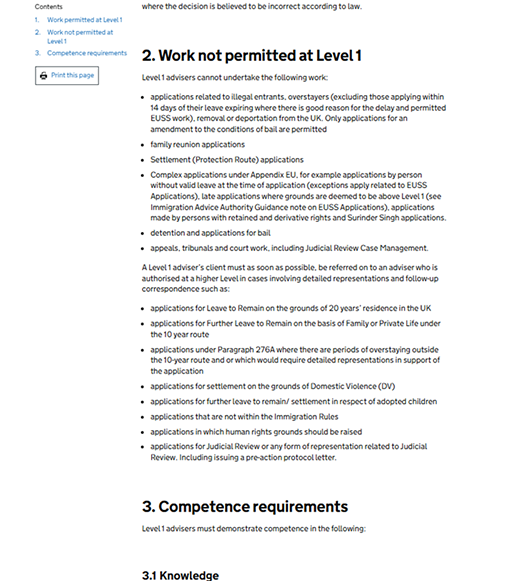1 The provision of immigration advice
The provision of advice on immigration matters is heavily regulated: the route to qualification as an immigration advisor is set by the Immigration Advice Authority (IAA) (before January 2025 it was known as the Office of the Immigration Services Commissioner (OISC).). The qualification route has three levels; each level determines the work that is permitted.
All qualified immigration advisors must:
- achieve a sufficient level of skills, knowledge and aptitudes. These are set out in the IAA syllabus and competences.
- demonstrate that they can provide good-quality advice and services.
There is a list of the competencies expected of an immigration advisor at each level; those expected of a Level 1 advisor were outlined in this course’s introduction.
Based on the 2021 competency framework, the work that a suitably qualified Level 1 immigration advisor can undertake is shown in Table 1.
| Area | Work permitted |
|---|---|
Asylum and protection |
Notifying the UKVI of a change of address Straightforward applications to vary the conditions attached to leave already granted, including conditions attached to bail granted by the Secretary of State Straightforward applications for ‘leave in line’ or refugee status for UK-born children of refugees and people with humanitarian protection |
Immigration | Basic applications for entry clearance, or leave to enter or remain in the UK Applications for Administrative Review, apart from those refused on the basis of credibility or a fundamental issue of the genuineness of documents or relationships Straightforward applications to vary the conditions attached to leave already granted, including conditions attached to bail granted by the Secretary of State |
Of course, there is a wide range of work that a Level 1 advisor is not permitted to do. You will explore this further in Activity 1.
Activity 1: Level 1 advisors
Using an online search engine find the IAA website on GOV.uk and use information provided by the IAA website to identify what work a Level 1 advisor is not permitted to do. You can note down what you find in the space below.
(Hint: you may find the statutory guidance on competence helpful.)
Discussion
When the course team used the search term ‘IAA level one UK’, more than 5.7 million results were returned. From these we then identified the IAA information on GOV.UK.
However, when we used the search term ‘ IAA Level 1 work permitted’ it helped to refine and reduce the number of results provided and the first results was for ‘Statutory guidance - Guidance on competence 2021 - Level 1 - Advice and assistance Updated 1 July 2021’ at https://www.gov.uk/ government/ publications/ competence-oisc-guidance-2012/ guidance-on-competence-2017-pt-3 [Tip: hold Ctrl and click a link to open it in a new tab. (Hide tip)] .


Having found the IAA information and located the statutory guidance on competence we were able to identify that a Level 1 advisor could not deal with. This included:
- applications related to illegal entrants, overstayers (excluding those applying within 14 days of their leave expiring where there is good reason for the delay and permitted EUSS work), removal or deportation from the UK (applications for an amendment to the conditions of bail are permitted)
- family reunion applications
- Settlement (Protection Route) applications
- complex applications under Appendix EU
- detention and applications for bail.
In addition, the information noted that a Level 1 qualified IAA advisor is not allowed to undertake appeals, tribunals and court work – including Judicial Review Case Management. This work is done by immigration advisors with the higher-level qualifications.
This information was obtained from the 2021 statutory guidance for 2021 (IAA, 2021).
Searching online to find correct, reliable and up-to-date information is an important skill for any advisor at each IAA level. Here you were asked to access and identify information from the IAA website, which is hosted on GOV.UK, the official website for all branches of the UK Government.
Finding out the reliability of any information you find is also an important skill. GOV.UK is an official Government website that provided the date of the last update, which at the time of writing was I July 2021 (see https://www.gov.uk/government/publications/competence-oisc-guidance-2012). A quick further online search revealed that this was the last update to the IAA guidance on competence.
We will return to online searches for information in later activities.
The next section considers the IAA registration scheme.
